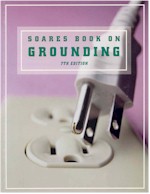 |
|
|
| ||||||
|
|
This page is the original source of this review, though you may also find it on Amazon or other sites. | ||
| Book Reviews Home | Free Audio Books | |
 |
Book Review of: Soares Book on GroundingSeventh Edition Prices vary, as this is a superseded version. See the latest edition here. Availability: Usually ships
within 24 hours |
| Review
of
Soares Book on Grounding, Seventh Edition (You can print this review in landscape mode, if you want a hardcopy) Reviewer: Mark Lamendola, widely known author in the electrical industry Soares has long been the grounding standard for "field people" in the electrical industry, while IEEE-142 has long been the grounding standard for electrical engineers. When you consider that Soares is a product of the International Association of Electrical Inspectors, this "division of labor" makes sense. Both standards rely on standard electrical theory, and both make fine references. I happen to have both, as I feel anyone working in electrical design, power quality, electrical construction, or related fields should. The Seventh Edition, which I am reviewing here, was published in 1999 and has been superseded twice as of this writing (2007). If you pick up a used copy of Soares for training purposes and general background, you will still find it very useful. If you are working a project, however, be sure to pick up the latest edition.
Chapter One provides an excellent overview of grounding concepts. Most of the people working in the electrical industry violate these concepts in practice because they don't understand them. The material in Chapter One is not outdated and about 99% of it never will be. Chapters Two through Four delve into specific aspects of grounding. Chapter Five starts talking about bonding. It's interesting to note that Part V of Article 250 of the National Electrical Code is all about bonding. This topic is where people really get confused, and they ground where they should bond. That particular mistake costs industry billions of dollars each year and produces a fair number of fatalities. Like the NEC, Soares often misuses the word "grounding" where it means "bonding." The reader must determine the meaning from the context. Basically, you always bond equipment rather than ground it. Grounding is an earth connection, and it serves no purpose at equipment because electricity is always trying to get back to its source and earth is not a bonding jumper. Soares has 17 chapters that explain grounding and bonding, and each has a quiz at the end (answers are in the back of the book). An 18th chapter consists of 15 informative tables. The Appendix contains an interesting piece titled, "The History and Mystery of Grounding." | |
About these reviewsYou may be wondering why the reviews here are any different from the hundreds of "reviews" posted online. Notice the quotation marks? I've been reviewing books for sites like Amazon for many years now, and it dismays me that Amazon found it necessary to post a minimum word count for reviews. It further dismays me that it's only 20 words. If that's all you have to say about a book, why bother? And why waste everyone else's time with such drivel? As a reader of such reviews, I feel like I am being told that I do not matter. The flippancy of people who write these terse "reviews" is insulting to the authors also, I would suspect. This sound bite blathering taking the place of any actual communication is increasingly a problem in our mindless, blog-posting Webosphere. Sadly, Google rewards such pointlessness as "content" so we just get more if this inanity. My reviews, contrary to current (non) standards, actually tell you about the book. I always got an "A" on a book review I did as a kid (that's how I remember it anyhow, and it's my story so I'm sticking to it). A book review contains certain elements and has a logical structure. It informs the reader about the book. A book review may also tell the reader whether the reviewer liked it, but revealing a reviewer's personal taste is not necessary for an informative book review. About your reviewer
About reading styleNo, I do not "speed read" through these. That said, I do read at a fast rate. But, in contrast to speed reading, I read everything when I read a book for review. Speed reading is a specialized type of reading that requires skipping text as you go. Using this technique, I've been able to consistently "max out" a speed reading machine at 2080 words per minute with 80% comprehension. This method is great if you are out to show how fast you can read. But I didn't use it in graduate school and I don't use it now. I think it takes the joy out of reading, and that pleasure is a big part of why I read. |
| |||||